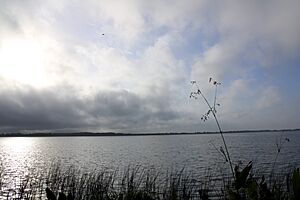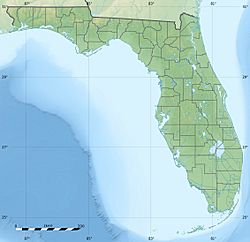Lake Hancock (Florida) facts for kids
Quick facts for kids Lake Hancock |
|
|---|---|

Lake Hancock as viewed from Circle B Bar Reserve.
|
|
| Location | Polk County, Florida |
| Coordinates | 27°58′15″N 81°50′17″W / 27.9708°N 81.8381°W |
| Primary outflows | Peace River (Florida) |
| Basin countries | United States |
| Surface area | 4,573 acres (18.51 km2) |
| Average depth | 4 ft (1.2 m) |
| Max. depth | 16 ft (4.9 m) |
| Water volume | 5,113,577,588 US gal (19,356,996.86 m3) |
| Settlements | Bartow, Highland City |
Lake Hancock is a large and important lake located just north of Bartow, Florida in Polk County, Florida. It plays a big role in the local environment and has a rich history.
Contents
About Lake Hancock
Lake Hancock is found in an area called the Polk Upland. This area is between two ridges known as Winter Haven Ridge and Lakeland Ridge. The lake is a key part of the upper Peace River system. This means it is very important for the environment across southwest Florida. The Southwest Florida Water Management District says so!
At about 4,573 acres (18.51 km2), Lake Hancock is one of the biggest lakes in Polk County. Imagine a triangle connecting the cities of Bartow, Lakeland, and Winter Haven. Lake Hancock covers more than a quarter of that area! The lake is quite shallow, with an average depth of 4 feet (1.2 m). Its deepest point is about 16 feet (4.9 m).
Plants and Animals of Lake Hancock
Lake Hancock is surrounded by beautiful cypress forests. Underneath the cypress trees, you'll mostly find red maple and black willow trees. The open water parts of the lake don't have much native plant life. However, sometimes a plant called hydrilla can grow there. Algae is also very common in the lake.
Amazing Wildlife
The lake is home to many American alligators. They live along the shoreline and often feed on birds from one of central Florida's largest bird nesting sites. This area is a busy spot for many types of wading birds.
Even though many lakes in Polk County are popular for fishing, Lake Hancock hasn't been used for fun fishing in many years. The main types of fish you'll find here are blue tilapia, threadfin shad, and suckermouth catfish.
History of Lake Hancock
Lake Hancock has a fascinating past, including early settlements.
Early Settlements
After the First Seminole War, a community called Minatti was started on the south shore of the lake. Minatti means "manatee". This settlement was created by maroons, who were people of African descent who had escaped slavery.
A Native American chief named Oponay also lived near the lake. He was a Lower Creek Chief from the Ocmulgee people. He had joined forces with a Red Stick leader named Peter McQueen. Oponay used to live by the Flint River in Georgia before the First Seminole War. He was also connected to another leader named Neamathla. Oponay and his group joined the British during the War of 1812. After the First Seminole War, they moved into Florida. The maroons with Oponay were likely those who had been with him near the Flint River. Both the Native American and maroon settlements were destroyed by the end of the Second Seminole War in 1842.
American Settlers
The first American families started to settle in the area around Lake Hancock in 1849. They set up small farms. Many people moved here after a big storm, the 1848 Tampa Bay hurricane, hit Tampa Bay in 1848.
Today, the Polk County Sheriff's Office has a training center, called the Burnham-McCall Training Center, located near where the old settlement used to be.
The Circle B Bar Reserve, a popular nature spot, is also located right on the lake.
 | DeHart Hubbard |
 | Wilma Rudolph |
 | Jesse Owens |
 | Jackie Joyner-Kersee |
 | Major Taylor |



